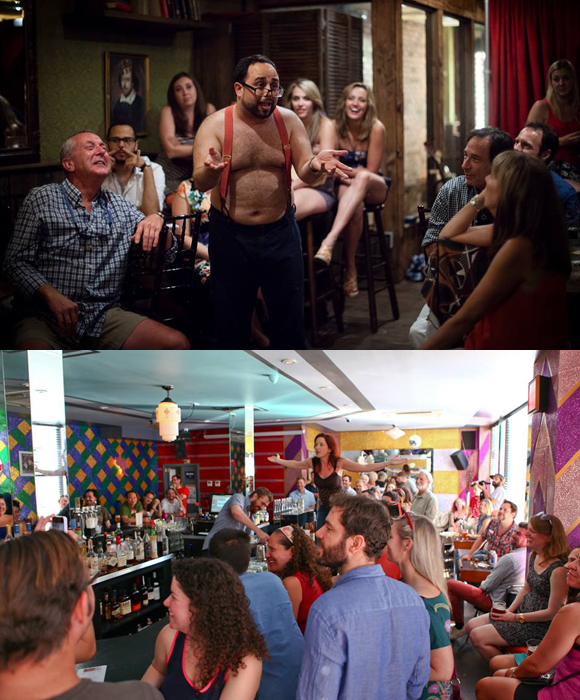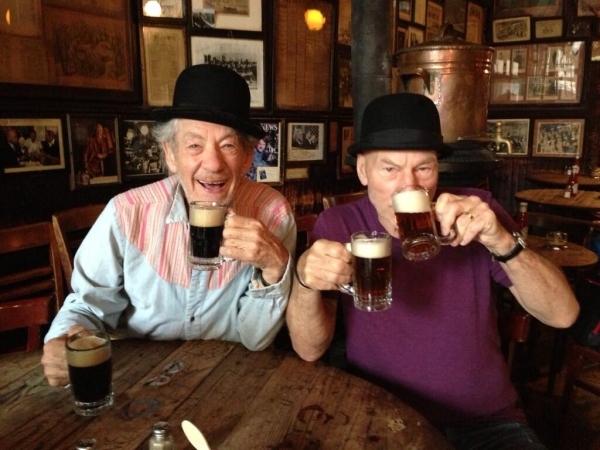Getting Drunk With Shakespeare

(below) Kelli Ruttle performs a scene during a ShakesBEER Pub Crawl at Beauty Bar in Park Slope, Brooklyn.
(photos courtesy of the productions)
"People are looking for an alternative source for entertainment," says theater director David Hudson. "What better way to go out with a few friends, hang out, have a few drinks, and get to see a great show?" Hudson is at the helm of Drunk Shakespeare, a theatrical experience at Quinn's Bar & Grill in Hell's Kitchen that involves one intoxicated actor attempting to lead a small cast through a play by William Shakespeare in under 90 minutes. The concept comes from the belief that "some of Shakespeare's best plays were penned while he was heavily under the influence," Hudson notes. While this theory is debatable at best, it's fair to note that nearly all of the Bard's plays have at least one scene where the characters are imbibing on "cakes and ale," and some of his greatest creations, from Sir Toby Belch to Falstaff, are big ole alcoholics.
Drunk Shakespeare, which recently extended its run at Quinn's through October, isn't the only production in town to blend the bar and the Bard. The up-and-coming New York Shakespeare Exchange has quickly been making a name for itself with its extremely popular ShakesBEER Pub Crawl, where audience members travel to four different bars in a particular New York City neighborhood to watch a small group of actors do scenes on tabletops. "My board had said we needed to find more ways to reach new audiences," says Artistic Director Ross Williams. "One of the things we're focused on is making sure Shakespeare is part of people's lives in exciting ways." They quickly nixed the idea of a single bar and opted for a pub crawl instead as a way to "mix it up so [audience members] could meet new people every time."
Both productions rely heavily on the ability to improv. With Drunk Shakespeare, anything is possible. "The script is in place as a jumping-off point, Hudson notes. "But forty to fifty percent is improvised based on audience suggestions, response, and reactions." Williams made sure that he could find actors with "a very strong sense of Shakespearean text combined with improvisational abilities and outdoor theater experience." The right fit is a performer who can "bring together the Shakespeare and the comedy" at the same time.
The Pub Crawl utilizes a variety of Shakespeare scenes that can naturally find a way to translate into imbibing. Any one crawl can feature moments from Henry IV to Twelfth Night. Drunk Shakespeare, conversely, only uses one play, and at this moment in time, it's Macbeth. "Tragedies tend to play well because of the heightened stakes," Hudson notes. "There were so many productions of it last year and we felt we could offer something new, exciting, and different." Eventually, though, their goal is to have a rotating roster of selections.
And while the audience is imbibing (four drinks factor into the ticket cost of the Pub Crawl, while tabs can be opened for Drunk Shakespeare), the actors mostly aren’t. "We have two casts that rotate, so each actor only drinks once a week at maximum," Hudson says of his production, which requires one actor to down five shots of either whiskey or tequila. "It's just the one each night for health and safety reasons." Williams adds that iced tea is the beverage of choice for the actors during the Pub Crawl.
"I think that audiences crave interaction," Hudson says when asked why he thinks Shakespeare and barroom productions are in vogue these days. "They crave the feeling of being part of the show rather than being a bystander. Theater and art and entertainment can be more than sitting in a dark room watching talented actors perform a play. Audiences are interested in being challenged in a way they aren't used to."
When it comes to which legendary Shakespearean actor they'd like to see in their production, there's agreement on the whole: Both Hudson and Williams choose the dynamic duo of Sir Patrick Stewart and Sir Ian McKellen. Williams notes,"I'd love to get them to come in and climb on a table with us and spout some Lear, or even Prospero." Hudson concludes, "They'd fit right in and jump right into the fray."

(photo via @SirPatStew)











